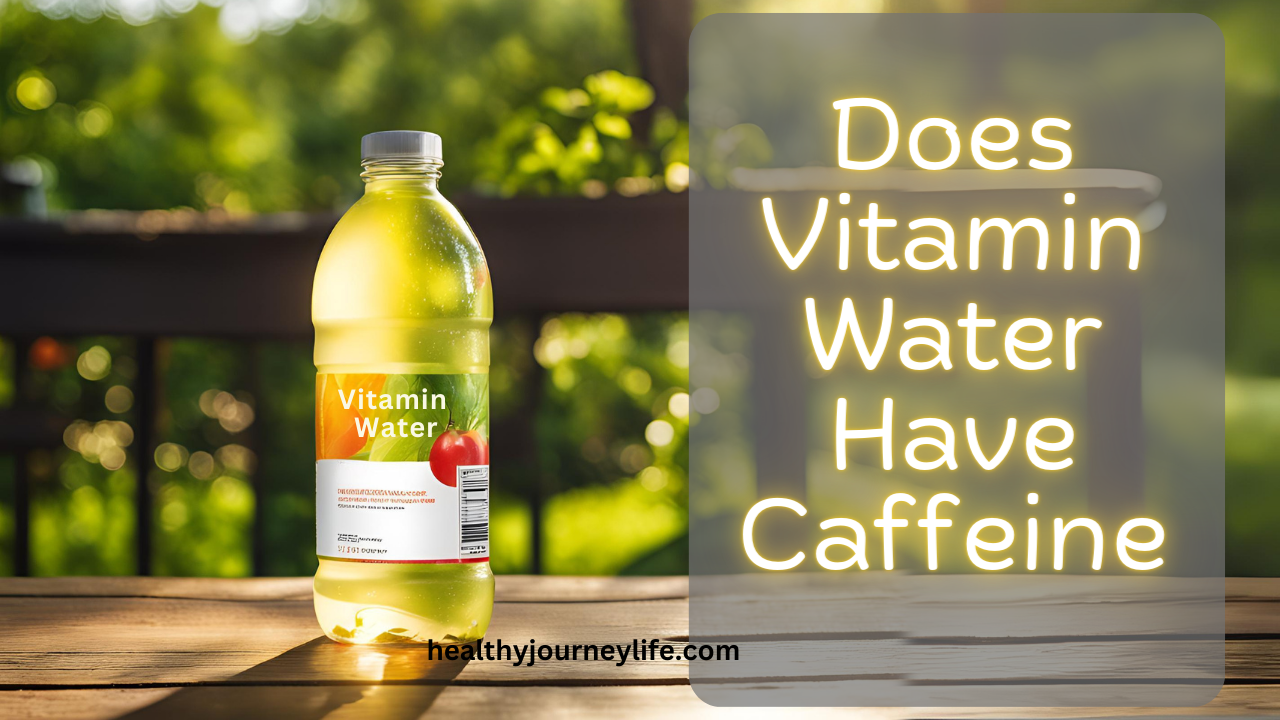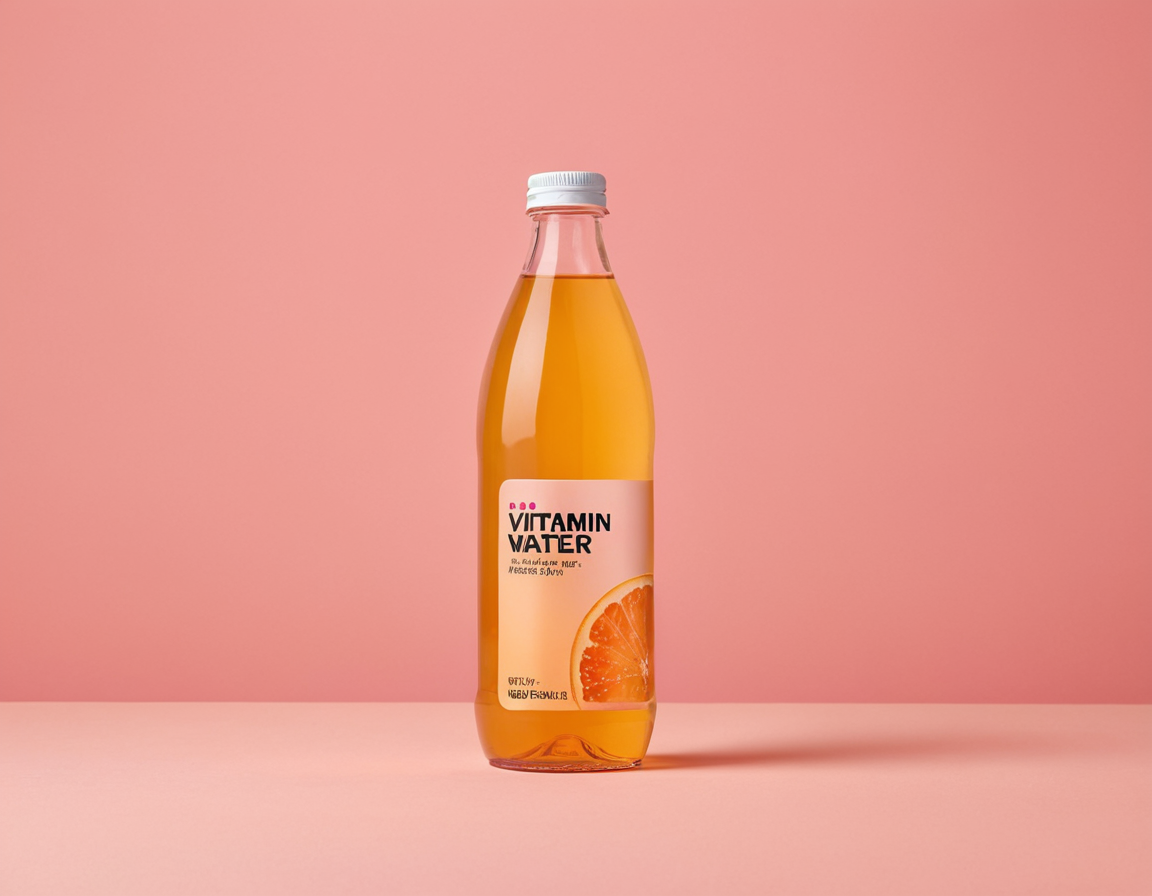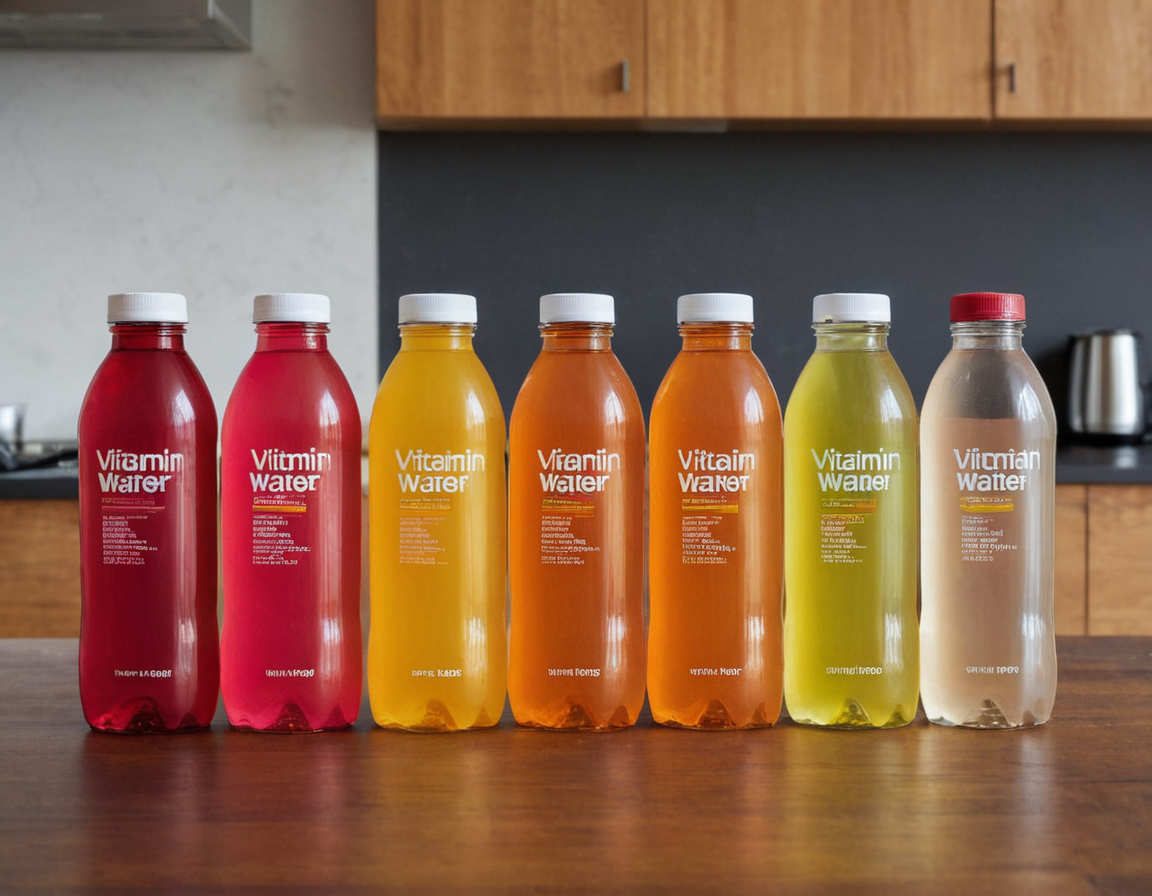Vitamin water has become a popular choice for those looking to stay hydrated while also getting a dose of vitamins and minerals. With its various flavors and health claims, it’s no wonder why people reach for it. However, one common question arises: does vitamin water have caffeine? To find out, let’s explore this subject thoroughly.
What is Vitamin Water Good For?
Vitamin water is essentially a flavored water beverage that is fortified with vitamins and minerals. The idea is to provide a tasty alternative to plain water while offering additional health benefits.
Vitamin Water quickly gained popularity, especially among health-conscious consumers and those seeking a more refreshing and functional beverage option. The brand’s catchy marketing campaigns and appealing flavor varieties, such as fruit punch, tropical citrus, and dragon fruit, contributed to its widespread recognition and success.
Ingredients in Vitamin Water
Vitamin Water is a popular enhanced water beverage that contains a blend of vitamins, minerals, and other ingredients. Most vitamin waters include a base of water, sweeteners (like cane sugar or stevia), natural flavors, and a blend of vitamins and minerals such as Vitamin C, B vitamins, and electrolytes. However, the ingredients can vary significantly between different brands and product lines, with some also containing preservatives and colorings.
It’s important to note that while Vitamin Water provides added vitamins and minerals, it also contains significant amounts of sugar and calories, which should be considered as part of a balanced diet.
Does Vitamin Water Have Caffeine
Does vitamin water have caffeine? Yes, Vitamin Water does contain caffeine, though the amount can vary across different flavors and varieties. Most regular Vitamin Water drinks contain around 33 mg of caffeine per 20 oz bottle. This is about the same as a 12-ounce can of cola in terms of caffeine content.
However, some Vitamin Water products are caffeine-free, while others contain higher levels of caffeine. For example, Vitamin Water Energy drinks have around 83 mg of caffeine per 20 oz bottle, providing a more substantial caffeine boost.
It’s important to check the nutrition label on each specific Vitamin Water product, as caffeine levels can differ. The caffeine content is typically listed under the ingredients or in the supplement facts panel. Being aware of the caffeine amount can help you manage your overall daily caffeine intake.
Caffeine Sources in Vitamin Water
Does Vitamin Water have caffeine? While some varieties of Vitamin Water contain caffeine, not all flavors or types include this ingredient. Most Vitamin Water varieties contain caffeine derived from natural plant sources. The primary source is green tea extract, which provides a modest amount of caffeine along with antioxidants like EGCG. Some Vitamin Water flavors also include guarana extract, a plant from the Amazon that contains concentrated levels of natural caffeine.
Unlike many sodas and energy drinks that use synthetic caffeine additives, Vitamin Water relies on these botanical ingredients to provide a gentle caffeine boost. The caffeine occurs naturally in the plant extracts rather than being artificially added. However, the specific levels can vary across different Vitamin Water varieties and flavors.
Caffeine Effects and Safety
The research on caffeine effects and safety often addresses questions such as “does vitamin water have caffeine?” to clarify potential sources of caffeine consumption. Caffeine is a stimulant that affects the central nervous system, providing a temporary energy boost and increased alertness. When consumed in moderation, it can enhance focus, improve mood, and aid in physical performance. However, there are drawbacks to drinking excessive amounts of caffeine.
Caffeine stimulates the release of adrenaline, which can increase heart rate, blood pressure, and body temperature. While this effect is generally mild for most people, those with underlying health conditions, such as heart problems or anxiety disorders, may experience more severe reactions.
Caffeine Side Effects
Many people wonder, “Does Vitamin Water have caffeine?” The short answer is yes, caffeine is present in some flavors of Vitamin Water, including the Energy kind. While caffeine can provide a temporary energy boost, it’s important to be aware of its potential side effects. Common side effects of consuming too much caffeine include jitters, restlessness, headaches, insomnia, and digestive issues like heartburn or upset stomach. Caffeine can also act as a diuretic, leading to dehydration if not accompanied by adequate water intake.
People react differently to caffeine; some are more susceptible to its effects than others. Factors like age, body weight, medication interactions, and genetics can influence caffeine tolerance levels.
It’s essential to monitor your caffeine consumption and be mindful of potential adverse effects, especially if you have pre-existing health conditions or are pregnant or breastfeeding. It is best to speak with a healthcare provider if you are concerned about how much caffeine you take or if you have ongoing negative effects.
Recommended Caffeine Limits
As we know the answer for does vitamin water have caffeine, let’s explore recommended caffeine limits. Caffeine is a stimulant, and its consumption should be moderated, especially for certain groups. Here are the recommended daily caffeine limits according to various health organizations:
Adults:
– Up to 400 milligrams (mg) per day for healthy adults, according to the Food and Drug Administration (FDA).
Pregnant Women:
– As advised by the American College of Obstetricians and Gynecologists (ACOG), no more than 200 mg daily.
Children and Adolescents:
– The American Academy of Pediatrics (AAP) recommends limiting caffeine intake for children and adolescents:
– Children under 12 years old: No more than 45 mg per day.
– Adolescents aged 12-18 years: No more than 100 mg per day.
It’s important to note that individual sensitivity to caffeine can vary, and some people may experience adverse effects even at lower doses. Pregnant women, individuals with certain medical conditions, and those taking certain medications should consult with their healthcare providers regarding safe caffeine consumption levels.
Caffeine in Other Beverages
As we know the answer for does vitamin water have caffeine is yes, it is important to realize that there can be considerable differences in the amount of caffeine in Vitamin Water compared to other popular beverages. The energy boost that comes from energy drinks or morning coffee is well-known to most people, but some teas and soft drinks can also contain a significant quantity of caffeine.
Coffee is one of the most well-known sources of caffeine, with a typical 8-ounce cup containing anywhere from 95 to 200 milligrams of caffeine, depending on the brew strength and variety. Energy drinks, such as Red Bull or Monster, can contain even more caffeine, with some having over 300 milligrams per serving.
Sodas and other carbonated beverages are often overlooked sources of caffeine. Mountain Dew includes about 54 milligrams of caffeine per 12-ounce drink, compared to about 35 mg in a 12-ounce can of Coca-Cola or Pepsi.
Caffeine is also present in tea, particularly in black and green kinds, however the exact amount depends on the variety and brewing technique. Eight ounces of black tea can have anywhere from 47 to 90 mg of caffeine, whereas an equivalent amount of green tea typically has between 24 and 45 mg.
In comparison, most Vitamin Water varieties contain relatively low levels of caffeine, ranging from 0 to 50 milligrams per bottle. However, it’s important to note that some flavors, such as Vitamin Water Energy, may have higher caffeine levels to provide an energy boost.
Comparing Caffeinated and Non-Caffeinated Vitamin Water
When comparing caffeinated and non-caffeinated vitamin waters, you’ll notice several differences:
- Nutritional Variations: In order to increase the caffeine content, caffeinated versions may contain added substances like guarana or green tea extract.
- Taste and Flavor: Some people find that caffeine alters the taste slightly, making it different from the non-caffeinated versions.
Usage Scenarios: Caffeinated vitamin waters are often marketed towards those needing a quick energy boost, while non-caffeinated ones are suitable for general hydration purposes.
Decaf and Caffeine-Free Options
For those looking to avoid caffeine entirely, there are decaffeinated and caffeine-free vitamin water alternatives available. Many brands offer caffeine-free varieties of their popular vitamin water flavors, allowing you to enjoy the refreshing taste and added nutrients without the stimulating effects of caffeine.
These decaf options typically undergo a process to remove the caffeine from the ingredients, such as using carbon filtration or water extraction methods. This ensures that the final product contains minimal or no caffeine, making it a suitable choice for individuals sensitive to caffeine or those who prefer to limit their intake.
When choosing a decaf or caffeine-free vitamin water, be sure to read the nutrition labels carefully to verify the caffeine content. On the packaging, certain manufacturers might also clearly state that the product is “caffeine-free” or “decaffeinated” for ease of recognition.
Alternatives to Caffeinated Vitamin Water
If you’re looking to avoid caffeine but still want a flavored beverage with added nutrients, consider the following:
- Herbal Infused Water: Infusions made from herbs and fruits can provide flavor without caffeine.
- Electrolyte Drinks: Many electrolyte beverages are caffeine-free and still offer hydration benefits.
- Homemade Vitamin Water: You can make your own by adding slices of fruit and a pinch of sea salt to your water.
Popular Myths About Vitamin Water and Caffeine
There are several myths surrounding vitamin water and caffeine:
- Myth 1: All vitamin waters contain caffeine. (Fact: Only some do.)
- Myth 2: Caffeinated vitamin water is a healthier energy drink. (Fact: It can be, but it depends on the other ingredients and your health needs.)
- Myth 3: Caffeine in vitamin water is harmful. (Fact: In moderation, it’s generally safe for most people.)
The Role of Vitamin Water in a Balanced Diet
Vitamin water can be a beneficial addition to your diet, especially if you struggle to consume enough vitamins from food alone. However, it’s important not to rely solely on these drinks for your nutritional needs. The best way to get vitamins and minerals should still be through whole foods.
Athletes and Vitamin Water with Caffeine
Athletes might benefit from caffeinated vitamin water due to the energy boost it can provide, which is particularly useful during endurance activities. But timing is important because if you take it too late in the day, it can interfere with your sleep cycle.
Vitamin Water for Different Age Groups
Does Vitamin Water have caffeine? is a common question among consumers seeking beverages suitable for different age groups. As we know the answer is yes, lets find out vitamin water recommendations for different age groups.
- Children: Generally, caffeine is not recommended for children, so caffeine-free vitamin water is a better choice.
- Adults: Both caffeinated and non-caffeinated options can be suitable depending on individual needs.
- Elderly: Caution is advised with caffeine due to potential interactions with medications and the increased risk of dehydration.
Environmental and Ethical Considerations
When choosing vitamin water, consider the environmental impact of plastic bottles. Choose brands that provide recycling programs or use recyclable materials. Additionally, check for ethical sourcing of ingredients to ensure sustainable practices.
Conclusion: Does Vitamin Water Have Caffeine
Vitamin water can be a convenient way to stay hydrated and get an extra boost of vitamins. While not all vitamin waters contain caffeine, those that do can provide an added energy boost. As always, it’s important to read labels and make informed choices that suit your lifestyle and health needs.
FAQs: Does Vitamin Water Have Caffeine
Does all vitamin water contain caffeine?
No, only specific varieties contain caffeine. Always check the label.
How much caffeine is in caffeinated vitamin water?
It varies by brand and product, but typically around 50 mg per bottle.
Is caffeine in vitamin water safe for children?
Caffeinated vitamin water is not recommended for children due to the potential negative effects of caffeine.
Can vitamin water replace regular water?
While it can supplement your hydration, plain water should still be the primary source of fluid intake.
Which brands of caffeine-free vitamin water are the best?
Popular caffeine-free options include most varieties of Propel, Lifewtr, and certain flavors of Vitaminwater.
You would like to read this too:


